#Audible di Amazon
Text
Nasce Nina il podcast della SIL
Nasce Nina il podcast della SIL
NINA nasce per rilanciare parte del materiale audio prodotto dalla ricerca SIL e di presentare contenuti nuovi implementando l’attitudine alla comunicazione che ha sempre contraddistinto il lavoro di ricerca della Società Italiana delle Letterate.
Dopo mesi di progettazione sono molto felice di annunciare la pubblicazione della prima puntata di NINA il podcast della Società Italiana delle…
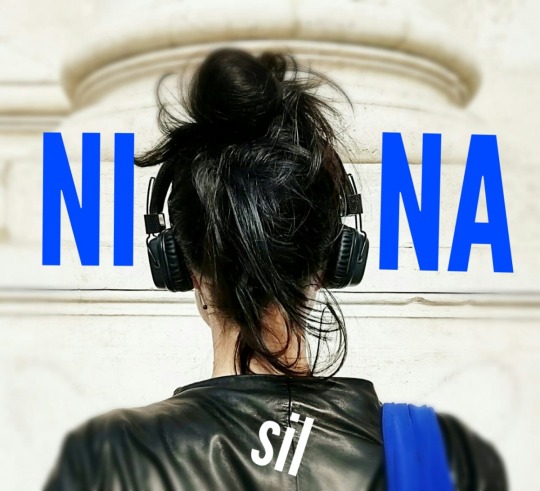
View On WordPress
#Adriana Cavarero#anna toscano#Audible di Amazon#Chiara Zamboni#Daniela Santi#diotoma#elvira federici#Luisa muraro#Sara Michieletto#Società Italiana delle Letterate#spotify#Università degli Studi di Verona#Viviana Scarinci#Wanda Tommasi
0 notes
Text
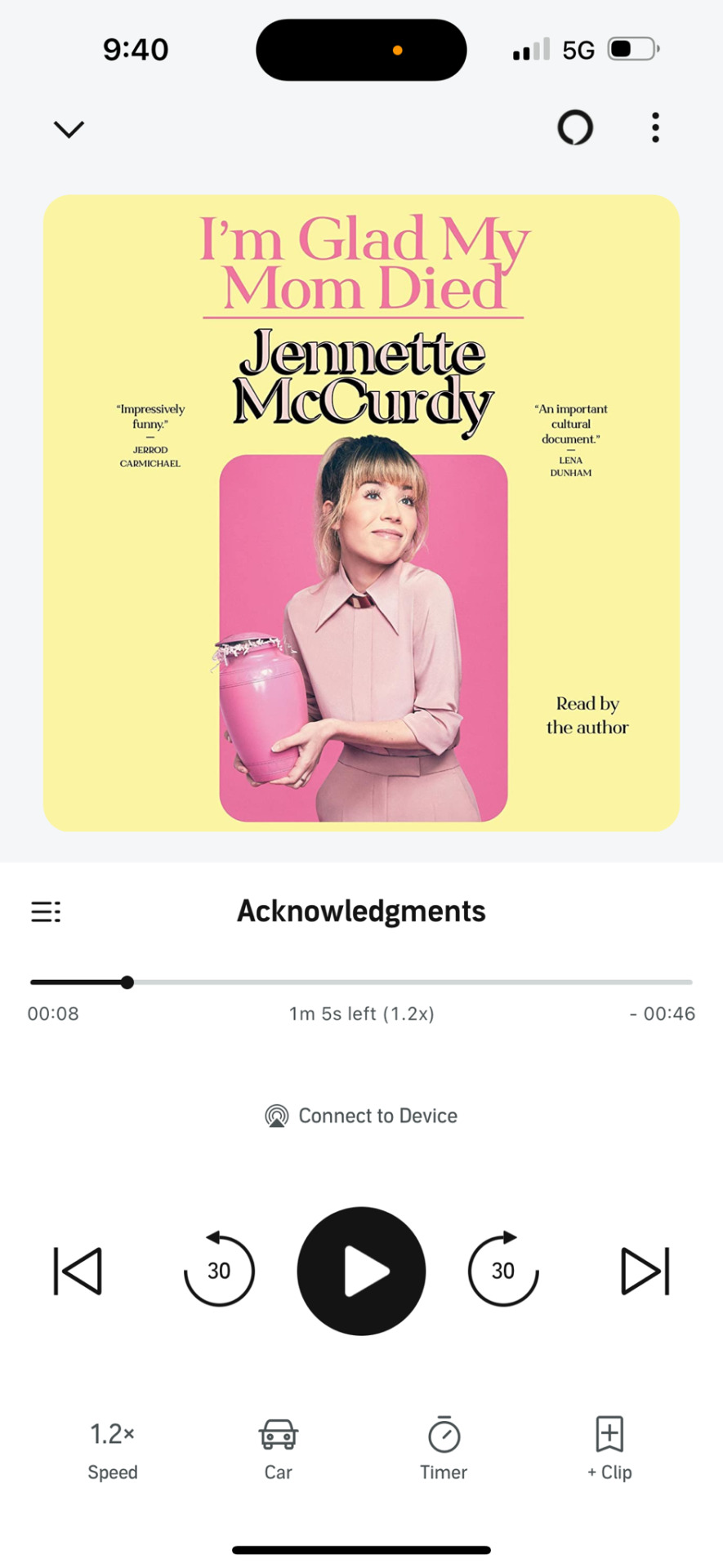
I am seriously speechless. 🥺🥺
⭐️⭐️⭐️⭐️⭐️/5
#bookaddict#bookish#bookworm#book blog#books#happiness#books and libraries#librarylife#librarylove#booklr#bookaholic#amazon#public libraries#kindle#kindleunlimited#audiobook#audible#jeanette mccurdy#i’m glad my mom died
4 notes
·
View notes
Text
💗NEW AUDIOBOOK ALERT💗
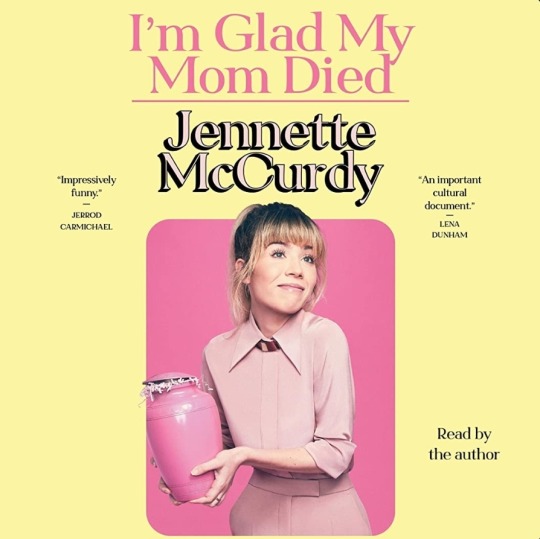
Happy national book lovers day to all my fellow bookworms out there!
Jennette McCurdy came out with a new book and it's available on Audible for free! Amazon is offering a free month trial of Audible Plus. I was going to get a physical copy but your girl is on a budget so she needs to save all the money she can. 🥲
I've listened up to chapter 9 and all I can say is wow. It is fun to listen to because you can hear the emotion in Jennette's voice as she recalls her early life as a young actor.
Cannot wait to finish this auditory story and share my thoughts with you all on here.
#writer#journal#thoughts#personal entry#love#audiobook#new#audible#duhwritemind#bookworm#national book lovers day#book lover#jennette mccurdy#I'm glad my mom died#amazon deals#memoir
2 notes
·
View notes
Text
Kickstarting a book to end enshittification, because Amazon will not carry it

My next book is The Internet Con: How to Seize the Means of Computation: it’s a Big Tech disassembly manual that explains how to disenshittify the web and bring back the old good internet. The hardcover comes from Verso on Sept 5, but the audiobook comes from me — because Amazon refuses to sell my audio:
https://www.kickstarter.com/projects/doctorow/the-internet-con-how-to-seize-the-means-of-computation
Amazon owns Audible, the monopoly audiobook platform that controls >90% of the audio market. They require mandatory DRM for every book sold, locking those books forever to Amazon’s monopoly platform. If you break up with Amazon, you have to throw away your entire audiobook library.
That’s a hell of a lot of leverage to hand to any company, let alone a rapacious monopoly that ran a program targeting small publishers called “Project Gazelle,” where execs were ordered to attack indie publishers “the way a cheetah would pursue a sickly gazelle”:
https://www.businessinsider.com/sadistic-amazon-treated-book-sellers-the-way-a-cheetah-would-pursue-a-sickly-gazelle-2013-10
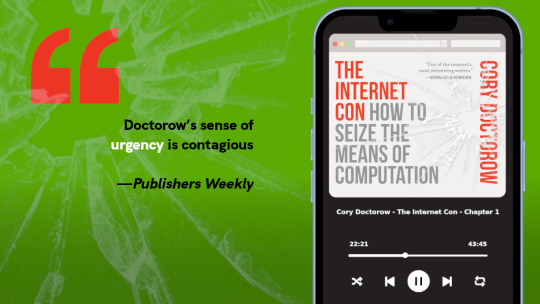
[Image ID: Journalist and novelist Doctorow (Red Team Blues) details a plan for how to break up Big Tech in this impassioned and perceptive manifesto….Doctorow’s sense of urgency is contagious -Publishers Weekly]
I won’t sell my work with DRM, because DRM is key to the enshittification of the internet. Enshittification is why the old, good internet died and became “five giant websites filled with screenshots of the other four” (h/t Tom Eastman). When a tech company can lock in its users and suppliers, it can drain value from both sides, using DRM and other lock-in gimmicks to keep their business even as they grow ever more miserable on the platform.
Here is how platforms die: first, they are good to their users; then they abuse their users to make things better for their business customers; finally, they abuse those business customers to claw back all the value for themselves. Then, they die:
https://pluralistic.net/2023/01/21/potemkin-ai/#hey-guys
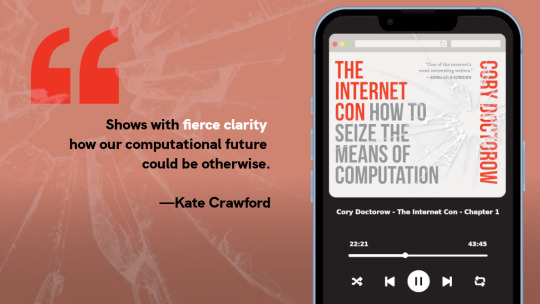
[Image ID: A brilliant barn burner of a book. Cory is one of the sharpest tech critics, and he shows with fierce clarity how our computational future could be otherwise -Kate Crawford, author of The Atlas of AI”]
The Internet Con isn’t just an analysis of where enshittification comes from: it’s a detailed, shovel-ready policy prescription for halting enshittification, throwing it into reverse and bringing back the old, good internet.
How do we do that? With interoperability: the ability to plug new technology into those crapulent, decaying platform. Interop lets you choose which parts of the service you want and block the parts you don’t (think of how an adblocker lets you take the take-it-or-leave “offer” from a website and reply with “How about nah?”):
https://www.eff.org/deeplinks/2019/07/adblocking-how-about-nah
But interop isn’t just about making platforms less terrible — it’s an explosive charge that demolishes walled gardens. With interop, you can leave a social media service, but keep talking to the people who stay. With interop, you can leave your mobile platform, but bring your apps and media with you to a rival’s service. With interop, you can break up with Amazon, and still keep your audiobooks.
So, if interop is so great, why isn’t it everywhere?
Well, it used to be. Interop is how Microsoft became the dominant operating system:
https://www.eff.org/deeplinks/2019/06/adversarial-interoperability-reviving-elegant-weapon-more-civilized-age-slay
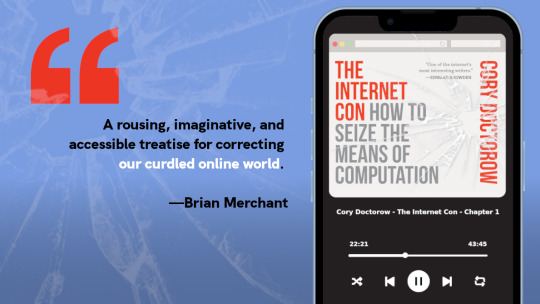
[Image ID: Nobody gets the internet-both the nuts and bolts that make it hum and the laws that shaped it into the mess it is-quite like Cory, and no one’s better qualified to deliver us a user manual for fixing it. That’s The Internet Con: a rousing, imaginative, and accessible treatise for correcting our curdled online world. If you care about the internet, get ready to dedicate yourself to making interoperability a reality. -Brian Merchant, author of Blood in the Machine]
It’s how Apple saved itself from Microsoft’s vicious campaign to destroy it:
https://www.eff.org/deeplinks/2019/06/adversarial-interoperability-reviving-elegant-weapon-more-civilized-age-slay
Every tech giant used interop to grow, and then every tech giant promptly turned around and attacked interoperators. Every pirate wants to be an admiral. When Big Tech did it, that was progress; when you do it back to Big Tech, that’s piracy. The tech giants used their monopoly power to make interop without permission illegal, creating a kind of “felony contempt of business model” (h/t Jay Freeman).
The Internet Con describes how this came to pass, but, more importantly, it tells us how to fix it. It lays out how we can combine different kinds of interop requirements (like the EU’s Digital Markets Act and Massachusetts’s Right to Repair law) with protections for reverse-engineering and other guerrilla tactics to create a system that is strong without being brittle, hard to cheat on and easy to enforce.
What’s more, this book explains how to get these policies: what existing legislative, regulatory and judicial powers can be invoked to make them a reality. Because we are living through the Great Enshittification, and crises erupt every ten seconds, and when those crises occur, the “good ideas lying around” can move from the fringes to the center in an eyeblink:
https://pluralistic.net/2023/06/12/only-a-crisis/#lets-gooooo

[Image ID: Thoughtfully written and patiently presented, The Internet Con explains how the promise of a free and open internet was lost to predatory business practices and the rush to commodify every aspect of our lives. An essential read for anyone that wants to understand how we lost control of our digital spaces and infrastructure to Silicon Valley’s tech giants, and how we can start fighting to get it back. -Tim Maughan, author of INFINITE DETAIL]
After all, we’ve known Big Tech was rotten for years, but we had no idea what to do about it. Every time a Big Tech colossus did something ghastly to millions or billions of people, we tried to fix the tech company. There’s no fixing the tech companies. They need to burn. The way to make users safe from Big Tech predators isn’t to make those predators behave better — it’s to evacuate those users:
https://pluralistic.net/2023/07/18/urban-wildlife-interface/#combustible-walled-gardens
I’ve been campaigning for human rights in the digital world for more than 20 years; I’ve been EFF’s European Director, representing the public interest at the EU, the UN, Westminster, Ottawa and DC. This is the subject I’ve devoted my life to, and I live my principles. I won’t let my books be sold with DRM, which means that Audible won’t carry my audiobooks. My agent tells me that this decision has cost me enough money to pay off my mortgage and put my kid through college. That’s a price I’m willing to pay if it means that my books aren’t enshittification bait.
But not selling on Audible has another cost, one that’s more important to me: a lot of readers prefer audiobooks and 9 out of 10 of those readers start and end their searches on Audible. When they don’t find an author there, they assume no audiobook exists, period. It got so bad I put up an audiobook on Amazon — me, reading an essay, explaining how Audible rips off writers and readers. It’s called “Why None of My Audiobooks Are For Sale on Audible”:
https://pluralistic.net/2022/07/25/can-you-hear-me-now/#acx-ripoff
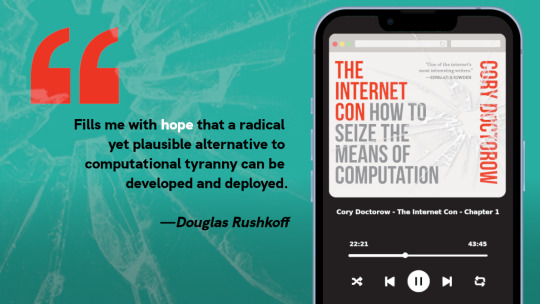
[Image ID: Doctorow has been thinking longer and smarter than anyone else I know about how we create and exchange value in a digital age. -Douglas Rushkoff, author of Present Shock]
To get my audiobooks into readers’ ears, I pre-sell them on Kickstarter. This has been wildly successful, both financially and as a means of getting other prominent authors to break up with Amazon and use crowdfunding to fill the gap. Writers like Brandon Sanderson are doing heroic work, smashing Amazon’s monopoly:
https://www.brandonsanderson.com/guest-editorial-cory-doctorow-is-a-bestselling-author-but-audible-wont-carry-his-audiobooks/
And to be frank, I love audiobooks, too. I swim every day as physio for a chronic pain condition, and I listen to 2–3 books/month on my underwater MP3 player, disappearing into an imaginary world as I scull back and forth in my public pool. I’m able to get those audiobooks on my MP3 player thanks to Libro.fm, a DRM-free store that supports indie booksellers all over the world:
https://blog.libro.fm/a-qa-with-mark-pearson-libro-fm-ceo-and-co-founder/
Producing my own audiobooks has been a dream. Working with Skyboat Media, I’ve gotten narrators like @wilwheaton, Amber Benson, @neil-gaiman and Stefan Rudnicki for my work:
https://craphound.com/shop/

[Image ID: “This book is the instruction manual Big Tech doesn’t want you to read. It deconstructs their crummy products, undemocratic business models, rigged legal regimes, and lies. Crack this book and help build something better. -Astra Taylor, author of Democracy May Not Exist, but We’ll Miss It When Its Gone”]
But for this title, I decided that I would read it myself. After all, I’ve been podcasting since 2006, reading my own work aloud every week or so, even as I traveled the world and gave thousands of speeches about the subject of this book. I was excited (and a little trepedatious) at the prospect, but how could I pass up a chance to work with director Gabrielle de Cuir, who has directed everyone from Anne Hathaway to LeVar Burton to Eric Idle?
Reader, I fucking nailed it. I went back to those daily recordings fully prepared to hate them, but they were good — even great (especially after my engineer John Taylor Williams mastered them). Listen for yourself!
https://archive.org/details/cory_doctorow_internet_con_chapter_01
I hope you’ll consider backing this Kickstarter. If you’ve ever read my free, open access, CC-licensed blog posts and novels, or listened to my podcasts, or come to one of my talks and wished there was a way to say thank you, this is it. These crowdfunders make my DRM-free publishing program viable, even as audiobooks grow more central to a writer’s income and even as a single company takes over nearly the entire audiobook market.
Backers can choose from the DRM-free audiobook, DRM-free ebook (EPUB and MOBI) and a hardcover — including a signed, personalized option, fulfilled through the great LA indie bookstore Book Soup:
https://www.kickstarter.com/projects/doctorow/the-internet-con-how-to-seize-the-means-of-computation
What’s more, these ebooks and audiobooks are unlike any you’ll get anywhere else because they are sold without any terms of service or license agreements. As has been the case since time immemorial, when you buy these books, they’re yours, and you are allowed to do anything with them that copyright law permits — give them away, lend them to friends, or simply read them with any technology you choose.
As with my previous Kickstarters, backers can get their audiobooks delivered with an app (from libro.fm) or as a folder of MP3s. That helps people who struggle with “sideloading,” a process that Apple and Google have made progressively harder, even as they force audiobook and ebook sellers to hand over a 30% app tax on every dollar they make:
https://www.kickstarter.com/projects/doctorow/red-team-blues-another-audiobook-that-amazon-wont-sell/posts/3788112
Enshittification is rotting every layer of the tech stack: mobile, payments, hosting, social, delivery, playback. Every tech company is pulling the rug out from under us, using the chokepoints they built between audiences and speakers, artists and fans, to pick all of our pockets.
The Internet Con isn’t just a lament for the internet we lost — it’s a plan to get it back. I hope you’ll get a copy and share it with the people you love, even as the tech platforms choke off your communities to pad their quarterly numbers.

Next weekend (Aug 4-6), I'll be in Austin for Armadillocon, a science fiction convention, where I'm the Guest of Honor:
https://armadillocon.org/d45/

If you'd like an essay-formatted version of this thread to read or share, here's a link to it on pluralistic.net, my surveillance-free, ad-free, tracker-free blog:
https://pluralistic.net/2023/07/31/seize-the-means-of-computation/#the-internet-con

[Image ID: My forthcoming book 'The Internet Con: How to Seize the Means of Computation' in various editions: Verso hardcover, audiobook displayed on a phone, and ebook displayed on an e-ink reader.]
#pluralistic#trustbusting#big tech#gift guide#kickstarter#the internet con#books#audiobooks#enshitiffication#disenshittification#crowdfunders#seize the means of computation#audible#amazon#verso
15K notes
·
View notes
Text
Jenna Coleman: The Audios
With the announcement of a new digital audio book read by Jenna Coleman coming soon, I thought it might be handy to give a quick list of her recorded works so far. This doesn't include commercial/documentary narration or video game voiceovers, obviously.
All these I believe are all available digitally in some form, too. (Officially or unofficially):
The Secret Garden - recorded in 2012-2013 for AudioGo, Jenna reads an abridged version of the children's story. The CD is hard to come by, since AudioGo went out of business soon after its release.
Doctor Who: Destiny of the Doctor - The Time Machine. Part of a year-long series of original narrated audio dramas produced by Big Finish in conjunction with AudioGo/BBC Audio for the 50th anniversary in 2013. This was the Eleventh Doctor chapter of the storyline, but incredibly and inexplicably it does not feature Clara but rather a one-off companion named Alice. Jenna nonetheless narrates the tale and plays both Alice and the Eleventh Doctor. My head canon is Alice is a Clara echo. AudioGo died almost immediately after its release, but Big Finish covered its distribution and I think you can still buy the MP3 version from them, along with the rest of the Destiny arc. Thus far it remains Jenna's only Big Finish-related audio work.
A Christmas Carol - Jenna's first audio drama involvement sees her playing a (relatively small) role in an all-star performance of the Dickens story, recorded while she was starring in Victoria (there were photos of her posted visiting Victoria showrunner/writer Daisy Goodwin at a book signing fresh from the recording session). Only released on Audible (apparently available for free in some places). I've never heard this myself.
"Pressures, Residential" - a short story recorded as a fund-raiser for Esquire UK magazine during lockdown. It basically reads like a story you might come across in something like Black Mirror or Inside No. 9. As a bonus, you get to hear Jenna utter a word we don't hear from her again until The Sandman. It's still available to listen to online from Esquire (it's an official page so I can link to it without violating a TOS).
"The Tale of the Flopsy Bunnies." I don't know if this was recorded during lockdown or earlier, though it was released during. Jenna was one of a number of celebrity readers (including David Tennant among other Who veterans) contributing to the CD set "Beatrix Potter: The Complete Tales". I think this is still available on Amazon in CD form. Just the one story read by Jenna, though.
Iris Is More Than Okay by Natalie Cooper, a made-for-Audible original story, scheduled for release on May 16, 2024. Sadly, like A Christmas Carol, this will not be released to CD so it will be inaccessible to some. Not sure on length. This is not likely to be a full-length novel being an original so we're probably going to get something closer to 90 minutes-2 hours in length but I'm prepared to be corrected on that.
15 notes
·
View notes
Text
Palestinian Book Of The Day

Belladonna: Our Italian Summer: Anbara Salam
An evocative, atmospheric story of friendship and obsession set in the 1950s that follows two schoolgirls from Connecticut whose lives are changed forever when they travel to a silent convent in northern Italy to study art for a year
Isabella is beautiful, inscrutable, and popular. Her best friend, Bridget, keeps quietly to the fringes of their Connecticut Catholic school, watching everything and everyone, but most especially Isabella.
In 1957, when the girls graduate, they land coveted spots at the Accademia di Belle Arti di Pentila in northern Italy, a prestigious art history school in the grounds of a silent convent. There, free of her claustrophobic home and the town that will always see her and her Egyptian mother as outsiders, Bridget discovers she can re-invent herself as anyone she desires.
Only Isabella knows the real Bridget, just as Bridget knows the true Isabella. But as that glittering year goes on, Bridget begins to suspect Isabella is keeping secrets from her, secrets that will ruin all of her plans and that will change the course of their lives forever
Be sure not to buy from Amazon or Audible to aboid supporting the genocide instead look for secondhand on sites like ebay! And if you can buy directly from the author!
and before anyone comes at me for my tags: this account is the official book club for the coquette subculture and I would be doing a disservice to not only show solidarity with the Palestinians who likely exist within my subculture but also by not using my platform to spread information to those getting misinformation and also those who want to help but do not know how.
14 notes
·
View notes
Note
Hiay! You've mentioned that you're putting your audiobooks on Libby - do you mind sharing how that works for you as the author? How much does your cut differ per checkout vs per purchase?
(only if, of course, you care to share!)
So the way library lending and payment works for authors is that libraries will often pay 2x3 times what a single copy is worth in order to add it into their catalogue.
So for example with the audiobook, the customer price is set to $24.95 via Audible, but the library pays something like $40 for it. I probably should have set it higher, but I also want to incentivize libraries to buy copies so that more people can listen to it.
After that, depending on the country (not all libraries work the same) I receive a small payout every time the book is checked out. It’s not much, literal pennies in some cases, but if a book is popular enough it can add up.
Obviously, I earn more from outright individual sales, but I’m also fortunate enough that my readers are hugely supportive when it comes to getting their libraries to order my stuff and then actually follow through with checking it out. My Overdrive checks are my third highest earner each month after Amazon and Payhip. I think last month's earnings from library lending was 100-ish dollars, which is nothing to sneeze at in the slightest.
I won’t know what my earnings will look like from the audiobook via lending services until people start checking it out, but if it’s like the ebook it’ll likely fluctuate a lot and net a small amount of money each month until interest dies out.
178 notes
·
View notes
Text
se tutto va bene tra oggi e domani finisco the bell jar, nei prossimi giorni anche memorie d'una ragazza per bene. a inizio ottobre, purtroppo, mi scade la promozione di audible che ho attivato sei mesi fa e quindi cercherò di finire i giorni dell'eternità perché non posso pagare mai il prezzo pieno richiesto da amazon ogni mese solo per ascoltare libri mentre cucino e faccio cose in casa. ho qualche altro libro iniziato ma che finirò con calma e senza fare programmi, poi a ottobre non mi sforzerò per leggere più di due libri visti tutti i cambiamenti a cui mi dovrò adattare, penso che saranno the night circus e circe perché li voglio leggere da una vita. fare programmi sui libri da leggere è una delle mie parti preferite di avere come hobby la lettura. in questo periodo mi piace un sacco leggere gli ebook sul cellulare, questa cosa va a ondate, va e viene, ho un sacco di altri libricini che vorrei leggere, principalmente in lingua inglese e trovati tramite instagram/youtube, principalmente storie di streghe e fantasy, non so perché mi sono fissata così per ora
10 notes
·
View notes
Note
just a wild guess /gen: i think people are mad at audible because they are only acknowledging israel and not both israel and palestine at the very least?
also “tragic events in the middle east” is how audible phrased it. not OP.
it’s entirely tone deaf to give 6 months of free books in the first place when people are literally dying. but the overarching problem is also that audible chose to not speak up on the genocide happening nor chose to at least promote palestinian literature.
it’s less about dehumanising israelis and more about the obvious favouritism, y’know?
also, as admirable as the link for donations to the red crescent, it’s not of much use to palestinians right now because there are blockades places and they cannot receive any aid or relief. in fact, hospitals in palestine as of right now, are not even able to treat their patients. and, the banks are destroyed so there is no way for anyone to withdraw money in gaza (as reported by journalists on site)
would be much more helpful if you shared links to ceasefire petitions and BDS-approved boycott lists that directly fund the IDF.
tbh i feel like even israelis should boycott audible that was such performative activism from them.
Hi anon!
I'm responding to this because you're genuine and you're polite, which I appreciate. So many people don't bother with human decency, I want to acknowledge it. You are a person just like me trying real hard just like me and I want to send you my appreciation rather than ignore you.
However, I feel like you missed my point entirely. Maybe some time I will go over it point by point in detail with sources and shit, because you seem a decent person and maybe we could have an actual conversation, but we are it seems on very different pages and putting us on the same page would be a lot of work. A lot of what you said is misleading or only part of the picture, but I am very very tired and very sad, I can't do this right now. People I know have died and my heart aches. You understand that, I hope. Talking about this just makes me sadder. Can only do a little bit at a time, you know?
In short:
In case that wasn't clear: what is happening in Palestine (to avoid the "SiTuAtiON 😐" lingo it's being bombed and invaded, thousands of people are dead, probably tens of thousands even, most civillians and many children) is deeply deeply sad and upsetting. A dead child is a dead child and I am angered and hurt by it just the same. Civilian death is sad no matter what side they are on.
I am not your enemy. Our relationship may be complicated, but in many ways we are allies.
It is tone deaf but I didn't expect better from Amazon. This is a stupid publicity trick, it's pathetic. I did — god have pity on my poor soul — expect better from fellow leftists. This "😐" is the exact same patronizing indifference, done in the most stupid passive-aggressive way, that's the shit I'm talking about. This is how they talk about us, if not much worse.
I don't know how into social media you are, but if you've noticed: people talk a lot about Palestine (which again, is important) but they do not mention, not in one word in their dozens of posts on the topic, what happened on October 7th. If you get a lot of your info on social media, maybe you didn't know about it either. I empathize with what you are saying, I feel that kind of pain on my skin, because those same people are doing that to us. When people were being burned alive in their homes, children abused and shot, girls raped to the point of their bodies breaking, these same people were silent. I understand what you are talking about, deeply. Many of these people are upset when companies or celebraties do this kind of one sided thing and then go on to do the same to Israelis. When my people were dying, terribly, in horrific ways, they turned a blind eye, and that hurt, deeply. Especially as a Jewish person.
Donations do not only "get stuck" situationally, they are for the most part pocketed by Hamas, have been for years. It's one of the most rich terrorist organizations in the world, and a lot of it is money from people like you. The red crescent is one of the very few more reliable charities. I do unironically hope people donate — but they probably won't. This was meant to highlight the entire bullshitery of the situation. I'm well aware donations can be of little use. It's much more use than any of this garbage, though.
The BDS are a shitty antisemitic organization and I am kindly discouraging you from supporting them. I was going to link why they are shitty and antisemitic + peace organizations and charities you can participate and donate to instead but honestly I am so tired and I just want to cry. Do your own research. You got this.
Israelis' friends and family are dead. They are crying and aching while people here type away. Even with that, many are doing incredible amounts of activism — making food, donating clothes, delivering it all to the hundreds of thousands of people who've been forced to leave their homes near the borders. This is just one example. They are doing so much more than boycotting Amazon, which is honestly, excuse my french, a shitty lazy pathetic form of activism, that is basically what my post was about. People have been focusing on boycotts and random internet bullshit on Twitter instead of what really matters. Even the calls for ceasefire — Hamas have never in the history of its existence withheld a ceasefire agreement, and 240 civilians, 30 of them children, are still held hostage. Activism from the international pro-Palestine movements has been often useless, simplistic, ignorant and sometimes straight up violent. Just a few days ago a man was killed in a pro-Palestine protest. I don't want to discourage activism, quite the opposite. But people are so shit at it, meanwhile my people here and my brothers & sisters over the border are dying. Do you understand my frustration?
If this is what works for you I get that. The world is shit and you do anything to get a sense of control back. But I've lost too much and ache too much to have any time, energy or respect for the kind of bullshit these people have been up to.
If this is too harsh, or hurt your feelings, I am sorry. Again, the way I see it, you are my ally and I am yours. I hope you understand what I am saying and know my heart is with you. I hope your heart is with me, too.
Thank you for caring. Stay safe.
8 notes
·
View notes
Text
„Künstliche Intelligenz? Ich glaub, ich schaff’s noch bis zur Rente“
https://www.welt.de/kultur/article246109012/Kuenstliche-Intelligenz-Ich-glaub-ich-schaff-s-noch-bis-zur-Rente.html
„Künstliche Intelligenz? Ich glaub, ich schaff’s noch bis zur Rente“

Hat Sprechen nochmal anders trainiert: Tom WlaschihaQuelle: Jens Kalaene/ZB/picture alliance
Bei „Game of Thrones“ war Tom Wlaschiha der Mann ohne Gesicht. Jetzt ist er als Superheld in der Podcast-Serie „Marvel’s Wastelanders“ zu hören. Wie es ist, nur mit der Stimme zu agieren und vielleicht mal von der Technik überflüssig gemacht zu werden.
Mit ein bisschen Fantasie könnte das hier auch als Brücke eines Raumschiffs durchgehen. Man liegt mehr, als dass man sitzt. Ein Tablet hängt von der Decke vor einer Glasscheibe, hinter der sich das Weltall befinden könnte, aber normalerweise der Aufnahmeleiter sitzt.
Ein Tisch, Mikrofone. Es ist halbdunkel, der Ton ist halbtot. Es klingt alles sehr trocken, weil die dicken Wände alle Nebengeräusche abfangen.
Wir sind im Berliner Theaterviertel, das Deutsche Theater ist die Straße runter, das Berliner Ensemble um die Ecke wie der Friedrichstadtpalast, im Studio von Audible, einer Amazon-Tochter, Deutschlands fleißigstem und umsatzstärksten Produzenten von Hörliteratur.
Wegen „Marvel’s Wastelanders“ sind wir hier. „Marvel’s Wastelanders“ ist die neueste Ausstülpung des akustischen Multiversums von Audible und – wenn alles läuft, wie man es sich ein, zwei Stockwerke über den Studios ausgedacht hat – nicht nur ein kleiner Schritt, sondern ein Quantensprung für die Popularisierung der literarischen Audiokultur, die man sich bei Audible auf die Fahnen geschrieben hat und von der man lebt.
„Wastelanders“ wiederum ist Teil eines globalen Multiversums. Teil eines Nebenkosmos der Marvelschen Superheldenwelt – Unterplotabteilung „Guardians of the Galaxy“.
Die Geschichte geht ungefähr so los: Peter Quill, als Superheld besser bekannt als Star Lord – ein bisschen aus dem Leim gegangen inzwischen, Generation 50+, wenn man freundlich sein will – ist durch Zeit und Raum unterwegs mit seinem Kumpel Rocket Raccoon, gleiche Generation, aber politisch ungewaschener Waschbär.
Der Star Lord ist vom Super-, zum Lieferhelden mutiert. Wie ein Loriotsches Ehepaar gehen die angejahrten Helden miteinander um. Dem Rest der Leute mit den Superkräften geht es nicht besser, sie geistern durchs All wie ein versprengter Haufen Abgehängter.
Die Schurken mit Doctor Doom als Capo di tutti Capi regieren längst die Welt. Öd ist sie und leer. Genauso, wie sie in Superheldenepen sein soll – dystopisch halt. Eine Heldenreise zur Rettung von dem, was vom Kosmos übrigblieb, geht los. Sie absolvierte ihren Countdown in den USA. Da wurden die ersten sechs Staffeln der „Marvel’s Wastelanders“-Saga als Podcast produziert – jede Staffel kreist um die Sonne eines Superhelden, jede hat zehn Episoden. Audible, das weltweit agiert, produziert als eine Art Hörspielfranchise die „Wastelanders“-Ableger auf Französisch, Deutsch, Italienisch, Hindi und Japanisch.
Ein Deutscher als Held des Serienwesens
Jeweils akustisch ausgerichtet auf die Gewohnheiten, die Hörkultur der einzelnen Länder und besetzt mit schauspielerischen Superhelden. Devid Striesow ist der deutsche Vulgär-Waschbär, Sylvester Groth grummelt den erzbösen Doctor Doom.
Tom Wlaschiha – der Mann ohne Gesicht aus dem „Game of Thrones“-Kosmos, der brüchige Gestapo-Mann aus der „Boot“-Serie, einer der wenigen deutschen Superhelden des internationalen Serien- und Filmwesen – sitzt jetzt hier mit auf der Audible-Brücke.
Wlaschiha, 50+ seit ein paar Tagen, ist der Star Lord. Von Aus- dem-Leim-gegangen kann aber keine Rede sein. Während Corona hat Wlaschiha, eigentlich ganz froh darüber, nicht soviel zu drehen wie vor der Pandemie, Fahrradfahren für sich entdeckt. Von Zynismus keine Spur. Von Fatalismus schon gar nicht.

Tom Wlaschiha und Devid Striesow (rechts) im TonstudioQuelle: Clémence Losfeld / Hans Lucas
Der Weg zum „Marvel’s Wastelanders“-Studio, sagt Wlaschiha, war für ihn der kürzeste Arbeitsweg aller Zeiten. Die Welt der Superhelden war für den in Neustadt bei Dresden aufgewachsenen Schauspieler in seiner Jugend allerdings Lichtjahre entfernt. Die Diggedaggs und die Abrafaxe gab es. Einmal im Monat in der Zeitschrift „Mosaik“.
Die war Bückware, sagt Wlaschiha und wahnsinnig schnell vergriffen. „Mein Opa hatte aber Beziehungen zum Zeitschriftenladen. Wir haben die dann zu Hause gesammelt, die waren ja auch ganz dünn.“ Irgendwann hat ihm dann sein Vater eröffnet, da wohnte er schon lang nicht mehr daheim, dass er die ganze Kiste einfach auf den Müll geworfen hat.“ Ein trauriger Moment.
Ein geschmuggeltes „Lustiges Taschenbuch“ aus dem Westen hatten sie manchmal auch, das wurde dann so lange gelesen, bis es auseinanderfiel. „Superhelden gab es nicht“, sagt Wlaschiha.
Mixtapes, wie das hinter der sein Star Lord samt seinem Waschbär in „Guardians of the Galaxy“ herjagt, kennt Wlaschiha noch, hat er auch aufgenommen damals, hat er noch ein paar von. Seine Hörspielsozialisation verlief allerdings Universen entfernt von der eines durchschnittlichen bundesrepublikanischen Spätboomers. Kein Winnetou („Karl May war verpönt“), keine „Drei ???“ („Gab es nicht“).
Schallplatten mit Märchen und Geschichten allerdings gab es. „Die wurden von Kollegen hier gegenüber gelesen“, sagt Wlaschiha. „Kollegen vom Deutschen Theater. Die waren sensationell. Von Inge Keller habe ich noch eine Schallplatte zu Hause, da spricht sie Monologe. Da muss man überhaupt nichts mehr sehen.“
Aber das, sagt Wlaschiha, „war auch eine andere, eine ausgestorbene Sprechkultur. Viel zu gemacht, würde man heute sagen. Ich fand das ganz toll, was man einzig mit der Stimme erzählen kann.“
Er selbst, der vom Theater kommt, hat sich das, dieses Großspielen, dieses Zuviel mühevoll abgewöhnen müssen. Am Anfang ist er regelrecht erschrocken, als er auf der Leinwand und auf dem Bildschirm gesehen hat, was er da machte und wie er da für die letzte Reihe spielte, obwohl es die im Kino und im Wohnzimmer natürlich gar nicht gab. Hat dann gelernt, immer weniger, irgendwann beinahe gar nichts mehr zu machen. „Irgendwann tuned man sich selber so weit herunter, dass ,Wastelanders’“ fast wie eine Befreiung war“.
Sächseln verboten
Lang überlegen hat er nicht müssen, als ihn Audible anfragte. Wlaschiha liebt die Ausweitungen seines schauspielerischen Kosmos, an die er früher gar nicht gedacht hatte. Hörbücher einlesen, Lesungen machen, Hörspiele. Macht alles einen Riesenspaß.
Ein bisschen eingehegt wird er natürlich auch beim Hörspiel. Da gibt es – Striesow und er standen nicht ein Mal gemeinsam im Studio, Wlaschiha war der Erste – ein Gerüst von Timecodes, an die er sich halten musste und die festlegten, wie lang Sätze dauern dürfen.
Da gibt es einen Regisseur, der auf die Einhaltung dieser Timecodes achtet und darauf, wann Wlaschiha größer spielen durfte, als er es tat, und darauf, dass Wlaschihas leichter Sachsenunterton, auf dessen Einhegung wiederum er privat überhaupt nicht achtet, nicht allzu offensichtlich wurde.
Der kam schon des Öfteren um die Ecke, der Regisseur. Hat ihn erinnert, doch mal dicker aufzutragen. Trotzdem hat er sich selten so frei gefühlt in einem Studio wie im Universum des Peter Quill. Abgelesen hat er von einem Tablet, wie jenem das hier auf der Audible-Brücke von der Decke hängt.
Das musste so, allein schon, um den Kopf hochzuhalten beim Sprechen. Notizen hatte er sich daheim allerdings auf Papier gemacht. Tom Wlaschiha ist ein – sagt er – analoger Mensch. Führt noch einen analogen Kalender, in den er alles mit der Hand einträgt, weil, was einmal vom Kopf in die Finger ging, was einmal manuell notiert ist, anschließend gemerkt ist.
Podcasts als Format, mit dem Audible gerade zunehmend experimentiert, mag er sehr. Auf der Autobahn. Er fährt mit seinem Alfa gern lange Strecken (wenn er nicht gerade mit dem Rad die Alpen überquert und von München nach Venedig radelt – analog versteht sich, ohne Batterieunterstützung). Das entspannt enorm. Daheim herrscht Ruhe. Nebenbei irgendwas hören – gerade auch Musik – mag er genauso wenig wie sich mit künstlicher Intelligenz zu unterhalten.
Dagegen kann sich der Star Lord nicht wehren, ohne den (weiblichen!) Roboter, der Peter Quill und dem Super-Waschbären alles erklärt, wären sie nämlich aufgeschmissen. Aber die Marvel-Welt ist halt noch Äonen hin. Für jetzt und für sich hat Tom Wlaschiha nicht so enorm große Angst, dass seine Stimme, sein digitales Selbst ihn so schnell ersetzt, dass er nur noch Alfa fahren und Musik hören braucht. Fatalist sei er, das Gelächter ist groß, „aber ich glaub, ich schaff‘s grad noch bis zur Rente“. Ein bisschen wie Lachen im Keller klingt es schon.
Auf einer Party, erzählt er dann, haben sie sich von ChatGPT Witze erzählen lassen. Erzähl uns mal, haben sie gesagt, einen Witz mit drei Nonnen, einer Katze und ‘ner Bar. „Das war tatsächlich fast lustig“, sagt er. Auch das Gelächter über das „fast“, das ihm rausgerutscht ist, ist groß.
Aber es war, sagt er weiter, „wirklich frappierend, fast erschreckend. Weil ich immer sagen würde, künstliche Intelligenz kann Menschen nicht ersetzen, weil die Spontaneität fehlt und die Irrationalität, die ja irgendwie alle menschlichen Entscheidungen auszeichnet. Aber dieser Witz, den fand ich schon ein bisschen spooky“.
Gerade hatte er auch Karl Lauterbach am Telefon. Sein bester Freund hatte ihm eine Sprachnachricht geschickt und KI vorher befohlen, sie klingen zu lassen wie der Gesundheitsminister. Wlaschiha nahm ab, war erschüttert, fasziniert und hat sie bis zum Ende angehört.
Schule machen im Hörspiel, im Hörbuch sollte das aber eher nicht. Oliver Daniel, der Chef für alles Deutschsprachige bei Audible, sagt, bei ihnen stünde immer das professionelle Erzählen im Vordergrund, die professionell erzählte Geschichte, von professionellen Sprecherinnen und Sprechern gelesen. Andererseits sind sie sich über das Innovationspotenzial im Klaren, das in Text-to-Speech-Technologien (TTS), in sozusagen automatisiert lesenden Programmen steckt. „Aktuell haben wir keine TTS, keine Geschichtenerzählmaschinen. Aber wir beobachten das.“
Wie sagte der Kaiser, der Beckenbauer, der Superheld des deutschen Fußballs – „schaun mer mal, dann sehn mer scho“.
Die erste Staffel von „Marvel’s Wastelanders“ ist jetzt bei Audible zu hören.
#tom wlaschiha#devid striesow#marvel`s wastelanders: star-lord#article#interview#july 2023#german language
13 notes
·
View notes
Text
All right, I'm going to say my piece on this
I don't think I'd ever consider myself a Potterhead, but I grew up with those books, and the movies. I was in the fandom, I used to get just as excited about the next thing coming out as many people in my vicinity.
I'm not any more. I haven't been for years.
I got the HP audiobooks, just before the big transphobic Twitter rant in the middle of 2020. I'd been wanting those audiobooks for a long time, read by a narrator I'm not even sure I should continue liking at this point, but I loved him then and I wasn't going to let the oncoming storm stop me getting them.
I can hardly bring myself to listen to those audiobooks now, despite buying them from Audible/Amazon, with credits, to minimise the amount of money she got while still maintaining my own integrity. That's a hollow sentiment now, I'll be honest. I almost wish I had found a way to pirate them. Or maybe if I'd waited long enough I'd never have gotten them at all.
Every time JK Radfem is brought up in public online spaces, I get a sick twisty feeling in my stomach. I dread hearing what fresh cruelty she has inflicted on the trans community, especially in the UK. I watched Jessie Gender's video last week and my heart is still aching from what Aranok said (if I spelled that wrong I'm sorry, I only read it once).
When it comes to the game-I-shall-not-invoke-by-name, I have no stake in this fight. I am Cis, white, Christian and blind. I couldn't play it even if I had any interest in doing so, which I do not. Any dreams I had of going to Hogwarts died a long time ago, around the time I found out she said disabilities wouldn't exist in her world because they'd be magicked away.
I stand with the trans community, the Jewish community, the disabled community, and all other groups she has wronged. I do not want to give her another cent. I am tired of thinking about her, truthfully.
One thing I will not give up, because I refuse to let her take it from me. I will still write my HP crossover fanfictions. I disregard much of her worldbuilding in them, and she doesn't get anything from fanfiction.
Apart from this, I have nothing to say. I don't want to waste more energy on talking about this woman, or anything with her brand on it. She's not worth the space it would take up in the post. I can't make others' choices for them. I will not waste energy yelling about that, either. I choose not to support JK Radfem. I choose to support those she has harmed with her wide influence. I choose to move the fuck on with my life.
#JK Rowling CW#Harry Potter CW#Antisemitism#Transphobia#This post has been edited to be less of a flaming firebrand#I have said what I need to say
6 notes
·
View notes
Text
SURVIVING ABDUCTION: 6 Novels About Abduction Cases You Should Read
I don’t normally write about abduction cases where the person ends up coming out of it alive, but when it comes to True Crime novels those are the cases that I tend to read about the most. The cases listed here are what got me so into reading True Crime in the first place, and the stories that these women will tell you will shock you. It’s a miracle that they survived the horrors that they endured, some for many years. But they survived because they’re strong, and they never gave up hope. I’ll be listing the books in which I’ve read them.
COLLEEN STAN: THE SIMPLE GIFTS OF LIFE

Synopsis: This book was written by Colleen herself. She was kidnapped by a couple when she was 20 years old while hitchhiking. She was held captive for seven years as a sex slave and eventually even being used as a housekeeper. During these seven years she would be horrendously tortured, starved, sexually assaulted, degraded, and severely brainwashed. Most of her confinement would be spent inside a wooden box. This case was also made into a movie and a documentary.
Where to read:
Barnes & Noble:
Paperback $20.95
E-Book (Nook) $6.99
Where to watch:
Movie: “Girl In The Box” - Amazon Prime (Lifetime Movie Club subscription)
Documentary: “Colleen Stan: Girl In The Box Part 1 & 2 - Amazon Prime (A&E Crime Central subscription)
MY STORY: ELIZABETH SMART

Synopsis: This book was written by Elizabeth herself. She was abducted from her bedroom in the middle of the night by a man who had been stalking her. He deemed her as his chosen one, the one to be his second wife. He brought her back to where he lived in the woods with his first wife, who was equally as insane as he was. Elizabeth was only 14 at the time, and her captivity lasted for around nine months. She endured beatings if she didn’t obey their commands, nearly died of starvation, traveled by foot to another state, put up with extreme insanity, and worst of all she was sexually assaulted every single night. This case was also made into a movie (featuring Smart).
Where to read:
Amazon:
Kindle $11.99
Audible $7.49
Paperback $11.99
Hardcover $17.00
Where to watch:
“I Am Elizabeth Smart” - Amazon Prime (Lifetime Movie Club subscription)
SECRETS IN THE CELLAR

Synopsis: This book is about Elisabeth Fritzl (not written by her). This is the longest captivity case I have read about so far. She was held captive by her own father inside of a secret dungeon he built in his basement. It took him several years and a LOT of money to make this dungeon. She lived down there for 24 years before she was able to finally escape. She was sexually assaulted thousands of times, and had 7 children, three of which lived down in the dungeon with her. Meanwhile the whole time, her mother and siblings lived above her… and no one ever knew. This case was also made into a movie.
Where to read:
Amazon:
Kindle $8.99
Audible $7.49
Paperback $8.99
Where to watch:
“Girl In The Basement” Amazon Prime (Lifetime Movie Club subscription)
3096 DAYS IN CAPTIVITY: THE TRUE STORY OF MY ABDUCTION, EIGHT YEARS OF ENSLAVEMENT, AND ESCAPE

Synopsis: This case is about Natascha Kampusch, and the book was written by her. She was abducted when she was ten years old and held captive in a tiny basement for more than eight years. She claims that her captor never sexually abused her, but she did endure a LOT of physical and psychological abuse. She was badly beaten, degraded, verbally abused, and often starved. Elisabeth Frtizl actually talks about watching the news while she was in her own captivity about Natascha’s escape. This case was also made into a movie, but it can’t be watched on any streaming service as it was made in Germany. However, you can watch the documentary.
Where to read:
Amazon:
Kindle $9.99
Audible $24.49
Paperback $9.99
Where to watch:
“Kidnapped: Natascha Kampusch” Amazon Prime (included with Freevee)
A STOLEN LIFE: A MEMOIR
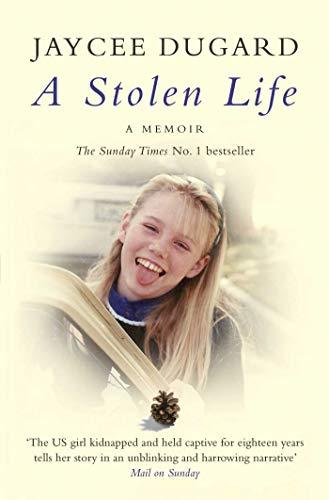
Synopsis: This case is about Jaycee Lee Dugard who was abducted when she was 11 years old. This book is written by Dugard herself. She was abducted by a couple, and was held captive for 18 years outside in a shed, and occasionally, another building on the property. She was repeatedly sexually assaulted on a daily basis for the first six years of her confinement, and although it slowed down a lot as time went on, it still happened on occasion. She had two children during this time, very soon after her abduction. Besides the sexual assault, she was taken care of, and very rarely physically abused. The two children were also kept outside with her.
Where to read:
Amazon:
Kindle $13.99
Audible $11.72
Paperback $11.99
Hardcover $14.48
RESURRECTION: THE KIDNAPPING OF ABBY DROVER

Synopsis: This book was not written by Abby. She was abducted by her neighbor when she was 12 years old, and held captive inside of a very tiny dungeon in his garage for nearly 6 months. During this time she was consistently sexually assaulted, occasionally beaten, and nearly starved to death.
Where to read:
Amazon:
Kindle FREE with Kindle Unlimited
Audible $7.49
Paperback $14.99
Hardcover $22.95
#true crime#true story#truecrime#true crime blog#true crime community#Crime#abduction#book#list#book recommendations#writing#writers on tumblr#Writerscommunity#blog#blogging#blogger#blog post#blogpost
12 notes
·
View notes
Photo

Wizard's have magical assistants that help them cast spells and stuff. These usually take the form of animals, like cats, owls, toads, and ravens, but most any animal could be a familiar. And what happens to them when their wizard dies? Find out today, as we take a little tour of Arnbjorg's Home for Orphaned Familiars!
Our podcast page:
https://kstb-kingdom-of-stonetree-broadcasting.castos.com/
You can find us on most major podcast/music service platforms
Apple podcast
https://podcasts.apple.com/us/podcast/kstb-kingdom-of-stonetree-broadcasting/id1488060408
Audible
https://www.audible.com/pd/Podcast/B08JJPKCZJ
Amazon music
https://music.amazon.com/podcasts/d24a2b33-a180-4342-a875-fe34aadacf9c/kstb--kingdom-of-stonetree-broadcasting
Stitcher
https://www.stitcher.com/show/kstb-kingdom-of-stonetree-broadcasting
Redbubble
https://www.redbubble.com/i/t-shirt/KSTB-Kingdom-of-Stonetree-Broadcasting-Logo-White-by-Arenthaer/53281995.FB110
New episodes NOT available on YouTube or sound cloud
We had cast members and family members watching on YouTube but it was not recording plays so we have not updated/new posts in some time.
You tube
https://www.youtube.com/channel/UC_KsknEZz_fsQBCkqPNvPng
Sound cloud
https://m.soundcloud.com/stonetreebroadcasting
Our alloted space on sound cloud is full you can listen to what’s there but nothing new will be added everywhere else updates regularly.
Twitter page
https://mobile.twitter.com/arenthaer
#KSTB#Kingdom of Stonetree Broadcasting#finola Vance#Arenthaer Gald#wizard#wizard podcast#Fantasy Podcast#podcast#Comedy PodCast#radio station podcast#Castos#apple podcasts#Audible#audio drama#amazon music#red bubble#soundcloud#Stitcher#youtube#twitter#fox#raccoon#sloth#tiger#skull
4 notes
·
View notes
Text

💣 Echo Buds Auricolari Wireless con Alexa e Cancellazione del Rumore
🤑 a soli 69,99€
➡️ https://www.scontomio.com/coupon/echo-buds-auricolari-wireless-con-alexa-e-cancellazione-del-rumore/?feed_id=228710&_unique_id=661bac48ba36f&utm_source=Tumblr&utm_medium=social&utm_campaign=Poster&utm_term=Echo%20Buds%20Auricolari%20Wireless%20con%20Alexa%20e%20Cancellazione%20del%20Rumore
Gli Echo Buds di Amazon sono auricolari wireless con cancellazione attiva del rumore, perfetti per un audio nitido e bilanciato. Comodi e compatti, sono resistenti al sudore e aderiscono perfettamente all'orecchio. Grazie all'App Alexa, puoi ascoltare in streaming musica, podcast e audiolibri Audible senza usare le mani. La batteria dura fino a 5 ore di riproduzione musicale per ogni carica e la custodia di ricarica wireless ti permette di avere fino a 15 ore di autonomia. Compatibili con iOS e Android, gli Echo Buds funzionano con Siri e l'Assistente Google. Proteggono la tua privacy grazie alla possibilità di disattivare i microfoni dall'App Alexa e di gestire le registrazioni vocali.
#coupon #offerteamazon #cuffieinear #offerteamazon #scontomio
0 notes
Text
Tiktok's enshittification
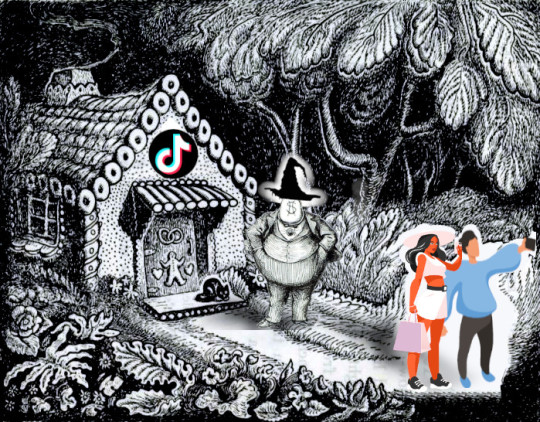
Here is how platforms die: first, they are good to their users; then they abuse their users to make things better for their business customers; finally, they abuse those business customers to claw back all the value for themselves. Then, they die.
If you’d like an essay-formatted version of this post to read or share, here’s a link to it on pluralistic.net, my surveillance-free, ad-free, tracker-free blog:
https://pluralistic.net/2023/01/21/potemkin-ai/#hey-guys
I call this enshittification, and it is a seemingly inevitable consequence arising from the combination of the ease of changing how a platform allocates value, combined with the nature of a “two sided market,” where a platform sits between buyers and sellers, hold each hostage to the other, raking off an ever-larger share of the value that passes between them.
When a platform starts, it needs users, so it makes itself valuable to users. Think of Amazon: for many years, it operated at a loss, using its access to the capital markets to subsidize everything you bought. It sold goods below cost and shipped them below cost. It operated a clean and useful search. If you searched for a product, Amazon tried its damndest to put it at the top of the search results.
This was a hell of a good deal for Amazon’s customers. Lots of us piled in, and lots of brick-and-mortar retailers withered and died, making it hard to go elsewhere. Amazon sold us ebooks and audiobooks that were permanently locked to its platform with DRM, so that every dollar we spent on media was a dollar we’d have to give up if we deleted Amazon and its apps. And Amazon sold us Prime, getting us to pre-pay for a year’s worth of shipping. Prime customers start their shopping on Amazon, and 90% of the time, they don’t search anywhere else.
That tempted in lots of business customers — Marketplace sellers who turned Amazon into the “everything store” it had promised from the beginning. As these sellers piled in, Amazon shifted to subsidizing suppliers. Kindle and Audible creators got generous packages. Marketplace sellers reached huge audiences and Amazon took low commissions from them.
This strategy meant that it became progressively harder for shoppers to find things anywhere except Amazon, which meant that they only searched on Amazon, which meant that sellers had to sell on Amazon.
That’s when Amazon started to harvest the surplus from its business customers and send it to Amazon’s shareholders. Today, Marketplace sellers are handing 45%+ of the sale price to Amazon in junk fees. The company’s $31b “advertising” program is really a payola scheme that pits sellers against each other, forcing them to bid on the chance to be at the top of your search.
Searching Amazon doesn’t produce a list of the products that most closely match your search, it brings up a list of products whose sellers have paid the most to be at the top of that search. Those fees are built into the cost you pay for the product, and Amazon’s “Most Favored Nation” requirement sellers means that they can’t sell more cheaply elsewhere, so Amazon has driven prices at every retailer.
Search Amazon for “cat beds” and the entire first screen is ads, including ads for products Amazon cloned from its own sellers, putting them out of business (third parties have to pay 45% in junk fees to Amazon, but Amazon doesn’t charge itself these fees). All told, the first five screens of results for “cat bed” are 50% ads.
https://pluralistic.net/2022/11/28/enshittification/#relentless-payola
This is enshittification: surpluses are first directed to users; then, once they’re locked in, surpluses go to suppliers; then once they’re locked in, the surplus is handed to shareholders and the platform becomes a useless pile of shit. From mobile app stores to Steam, from Facebook to Twitter, this is the enshittification lifecycle.
This is why — as Cat Valente wrote in her magesterial pre-Christmas essay — platforms like Prodigy transformed themselves overnight, from a place where you went for social connection to a place where you were expected to “stop talking to each other and start buying things”:
https://catvalente.substack.com/p/stop-talking-to-each-other-and-start
This shell-game with surpluses is what happened to Facebook. First, Facebook was good to you: it showed you the things the people you loved and cared about had to say. This created a kind of mutual hostage-taking: once a critical mass of people you cared about were on Facebook, it became effectively impossible to leave, because you’d have to convince all of them to leave too, and agree on where to go. You may love your friends, but half the time you can’t agree on what movie to see and where to go for dinner. Forget it.
Then, it started to cram your feed full of posts from accounts you didn’t follow. At first, it was media companies, who Facebook preferentially crammed down its users’ throats so that they would click on articles and send traffic to newspapers, magazines and blogs.
Then, once those publications were dependent on Facebook for their traffic, it dialed down their traffic. First, it choked off traffic to publications that used Facebook to run excerpts with links to their own sites, as a way of driving publications into supplying fulltext feeds inside Facebook’s walled garden.
This made publications truly dependent on Facebook — their readers no longer visited the publications’ websites, they just tuned into them on Facebook. The publications were hostage to those readers, who were hostage to each other. Facebook stopped showing readers the articles publications ran, tuning The Algorithm to suppress posts from publications unless they paid to “boost” their articles to the readers who had explicitly subscribed to them and asked Facebook to put them in their feeds.
Now, Facebook started to cram more ads into the feed, mixing payola from people you wanted to hear from with payola from strangers who wanted to commandeer your eyeballs. It gave those advertisers a great deal, charging a pittance to target their ads based on the dossiers of nonconsensually harvested personal data they’d stolen from you.
Sellers became dependent on Facebook, too, unable to carry on business without access to those targeted pitches. That was Facebook’s cue to jack up ad prices, stop worrying so much about ad fraud, and to collude with Google to rig the ad market through an illegal program called Jedi Blue:
https://en.wikipedia.org/wiki/Jedi_Blue
Today, Facebook is terminally enshittified, a terrible place to be whether you’re a user, a media company, or an advertiser. It’s a company that deliberately demolished a huge fraction of the publishers it relied on, defrauding them into a “pivot to video” based on false claims of the popularity of video among Facebook users. Companies threw billions into the pivot, but the viewers never materialized, and media outlets folded in droves:
https://slate.com/technology/2018/10/facebook-online-video-pivot-metrics-false.html
But Facebook has a new pitch. It claims to be called Meta, and it has demanded that we live out the rest of our days as legless, sexless, heavily surveilled low-poly cartoon characters.
It has promised companies that make apps for this metaverse that it won’t rug them the way it did the publishers on the old Facebook. It remains to be seen whether they’ll get any takers. As Mark Zuckerberg once candidly confessed to a peer, marvelling at all of his fellow Harvard students who sent their personal information to his new website “TheFacebook”:
> I don’t know why.
> They “trust me”
> Dumb fucks.
https://doctorow.medium.com/metaverse-means-pivot-to-video-adbe09319038
Once you understand the enshittification pattern, a lot of the platform mysteries solve themselves. Think of the SEO market, or the whole energetic world of online creators who spend endless hours engaged in useless platform Kremlinology, hoping to locate the algorithmic tripwires, which, if crossed, doom the creative works they pour their money, time and energy into:
https://pluralistic.net/2022/04/11/coercion-v-cooperation/#the-machine-is-listening
Working for the platform can be like working for a boss who takes money out of every paycheck for all the rules you broke, but who won’t tell you what those rules are because if he told you that, then you’d figure out how to break those rules without him noticing and docking your pay. Content moderation is the only domain where security through obscurity is considered a best practice:
https://doctorow.medium.com/como-is-infosec-307f87004563
The situation is so dire that organizations like Tracking Exposed have enlisted an human army of volunteers and a robot army of headless browsers to try to unwind the logic behind the arbitrary machine judgments of The Algorithm, both to give users the option to tune the recommendations they receive, and to help creators avoid the wage theft that comes from being shadow banned:
https://www.eff.org/deeplinks/2022/05/tracking-exposed-demanding-gods-explain-themselves
But what if there is no underlying logic? Or, more to the point, what if the logic shifts based on the platform’s priorities? If you go down to the midway at your county fair, you’ll spot some poor sucker walking around all day with a giant teddy bear that they won by throwing three balls in a peach basket.
The peach-basket is a rigged game. The carny can use a hidden switch to force the balls to bounce out of the basket. No one wins a giant teddy bear unless the carny wants them to win it. Why did the carny let the sucker win the giant teddy bear? So that he’d carry it around all day, convincing other suckers to put down five bucks for their chance to win one:
https://boingboing.net/2006/08/27/rigged-carny-game.html
The carny allocated a giant teddy bear to that poor sucker the way that platforms allocate surpluses to key performers — as a convincer in a “Big Store” con, a way to rope in other suckers who’ll make content for the platform, anchoring themselves and their audiences to it.
Which brings me to Tiktok. Tiktok is many different things, including “a free Adobe Premiere for teenagers that live on their phones.”
https://www.garbageday.email/p/the-fragments-of-media-you-consume
But what made it such a success early on was the power of its recommendation system. From the start, Tiktok was really, really good at recommending things to its users. Eerily good:
https://www.npr.org/transcripts/1093882880
By making good-faith recommendations of things it thought its users would like, Tiktok built a mass audience, larger than many thought possible, given the death grip of its competitors, like Youtube and Instagram. Now that Tiktok has the audience, it is consolidating its gains and seeking to lure away the media companies and creators who are still stubbornly attached to Youtube and Insta.
Yesterday, Forbes’s Emily Baker-White broke a fantastic story about how that actually works inside of Bytedance, Tiktok’s parent company, citing multiple internal sources, revealing the existence of a “heating tool” that Tiktok employees use push videos from select accounts into millions of viewers’ feeds:
https://www.forbes.com/sites/emilybaker-white/2023/01/20/tiktoks-secret-heating-button-can-make-anyone-go-viral/
These videos go into Tiktok users’ ForYou feeds, which Tiktok misleadingly describes as being populated by videos “ranked by an algorithm that predicts your interests based on your behavior in the app.” In reality, For You is only sometimes composed of videos that Tiktok thinks will add value to your experience — the rest of the time, it’s full of videos that Tiktok has inserted in order to make creators think that Tiktok is a great place to reach an audience.
“Sources told Forbes that TikTok has often used heating to court influencers and brands, enticing them into partnerships by inflating their videos’ view count. This suggests that heating has potentially benefitted some influencers and brands — those with whom TikTok has sought business relationships — at the expense of others with whom it has not.”
In other words, Tiktok is handing out giant teddy bears.
But Tiktok is not in the business of giving away giant teddy bears. Tiktok, for all that its origins are in the quasi-capitalist Chinese economy, is just another paperclip-maximizing artificial colony organism that treats human beings as inconvenient gut flora. Tiktok is only going to funnel free attention to the people it wants to entrap until they are entrapped, then it will withdraw that attention and begin to monetize it.
“Monetize” is a terrible word that tacitly admits that there is no such thing as an “Attention Economy.” You can’t use attention as a medium of exchange. You can’t use it as a store of value. You can’t use it as a unit of account. Attention is like cryptocurrency: a worthless token that is only valuable to the extent that you can trick or coerce someone into parting with “fiat” currency in exchange for it. You have to “monetize” it — that is, you have to exchange the fake money for real money.
In the case of cryptos, the main monetization strategy was deception-based. Exchanges and “projects” handed out a bunch of giant teddy-bears, creating an army of true-believer Judas goats who convinced their peers to hand the carny their money and try to get some balls into the peach-basket themselves.
But deception only produces so much “liquidity provision.” Eventually, you run out of suckers. To get lots of people to try the ball-toss, you need coercion, not persuasion. Think of how US companies ended the defined benefits pension that guaranteed you a dignified retirement, replacing it with market-based 401(k) pensions that forced you to gamble your savings in a rigged casino, making you the sucker at the table, ripe for the picking:
https://pluralistic.net/2020/07/25/derechos-humanos/#are-there-no-poorhouses
Early crypto liquidity came from ransomware. The existence of a pool of desperate, panicked companies and individuals whose data had been stolen by criminals created a baseline of crypto liquidity because they could only get their data back by trading real money for fake crypto money.
The next phase of crypto coercion was Web3: converting the web into a series of tollbooths that you could only pass through by trading real money for fake crypto money. The internet is a must-have, not a nice-to-have, a prerequisite for full participation in employment, education, family life, health, politics, civics, even romance. By holding all those things to ransom behind crypto tollbooths, the hodlers hoped to convert their tokens to real money:
https://locusmag.com/2022/09/cory-doctorow-moneylike/
For Tiktok, handing out free teddy-bears by “heating” the videos posted by skeptical performers and media companies is a way to convert them to true believers, getting them to push all their chips into the middle of the table, abandoning their efforts to build audiences on other platforms (it helps that Tiktok’s format is distinctive, making it hard to repurpose videos for Tiktok to circulate on rival platforms).
Once those performers and media companies are hooked, the next phase will begin: Tiktok will withdraw the “heating” that sticks their videos in front of people who never heard of them and haven’t asked to see their videos. Tiktok is performing a delicate dance here: there’s only so much enshittification they can visit upon their users’ feeds, and Tiktok has lots of other performers they want to give giant teddy-bears to.
Tiktok won’t just starve performers of the “free” attention by depreferencing them in the algorithm, it will actively punish them by failing to deliver their videos to the users who subscribed to them. After all, every time Tiktok shows you a video you asked to see, it loses a chance to show you a video it wants you to see, because your attention is a giant teddy-bear it can give away to a performer it is wooing.
This is just what Twitter has done as part of its march to enshittification: thanks to its “monetization” changes, the majority of people who follow you will never see the things you post. I have ~500k followers on Twitter and my threads used to routinely get hundreds of thousands or even millions of reads. Today, it’s hundreds, perhaps thousands.
I just handed Twitter $8 for Twitter Blue, because the company has strongly implied that it will only show the things I post to the people who asked to see them if I pay ransom money. This is the latest battle in one of the internet’s longest-simmering wars: the fight over end-to-end:
https://pluralistic.net/2022/12/10/e2e/#the-censors-pen
In the beginning, there were Bellheads and Netheads. The Bellheads worked for big telcos, and they believed that all the value of the network rightly belonged to the carrier. If someone invented a new feature — say, Caller ID — it should only be rolled out in a way that allows the carrier to charge you every month for its use. This is Software-As-a-Service, Ma Bell style.
The Netheads, by contrast, believed that value should move to the edges of the network — spread out, pluralized. In theory, Compuserve could have “monetized” its own version of Caller ID by making you pay $2.99 extra to see the “From:” line on email before you opened the message — charging you to know who was speaking before you started listening — but they didn’t.
The Netheads wanted to build diverse networks with lots of offers, lots of competition, and easy, low-cost switching between competitors (thanks to interoperability). Some wanted this because they believed that the net would someday be woven into the world, and they didn’t want to live in a world of rent-seeking landlords. Others were true believers in market competition as a source of innovation. Some believed both things. Either way, they saw the risk of network capture, the drive to monetization through trickery and coercion, and they wanted to head it off.
They conceived of the end-to-end principle: the idea that networks should be designed so that willing speakers’ messages would be delivered to willing listeners’ end-points as quickly and reliably as they could be. That is, irrespective of whether a network operator could make money by sending you the data it wanted to receive, its duty would be to provide you with the data you wanted to see.
The end-to-end principle is dead at the service level today. Useful idiots on the right were tricked into thinking that the risk of Twitter mismanagement was “woke shadowbanning,” whereby the things you said wouldn’t reach the people who asked to hear them because Twitter’s deep state didn’t like your opinions. The real risk, of course, is that the things you say won’t reach the people who asked to hear them because Twitter can make more money by enshittifying their feeds and charging you ransom for the privilege to be included in them.
As I said at the start of this essay, enshittification exerts a nearly irresistible gravity on platform capitalism. It’s just too easy to turn the enshittification dial up to eleven. Twitter was able to fire the majority of its skilled staff and still crank the dial all the way over, even with a skeleton crew of desperate, demoralized H1B workers who are shackled to Twitter’s sinking ship by the threat of deportation.
The temptation to enshittify is magnified by the blocks on interoperability: when Twitter bans interoperable clients, nerfs its APIs, and periodically terrorizes its users by suspending them for including their Mastodon handles in their bios, it makes it harder to leave Twitter, and thus increases the amount of enshittification users can be force-fed without risking their departure.
Twitter is not going to be a “protocol.” I’ll bet you a testicle¹ that projects like Bluesky will find no meaningful purchase on the platform, because if Bluesky were implemented and Twitter users could order their feeds for minimal enshittification and leave the service without sacrificing their social networks, it would kill the majority of Twitter’s “monetization” strategies.
¹Not one of mine.
An enshittification strategy only succeeds if it is pursued in measured amounts. Even the most locked-in user eventually reaches a breaking-point and walks away, or gets pushed. The villagers of Anatevka in Fiddler on the Roof tolerated the cossacks' violent raids and pogroms for years, until they were finally forced to flee to Krakow, New York and Chicago:
https://doctorow.medium.com/how-to-leave-dying-social-media-platforms-9fc550fe5abf
For enshittification-addled companies, that balance is hard to strike. Individual product managers, executives, and activist shareholders all give preference to quick returns at the cost of sustainability, and are in a race to see who can eat their seed-corn first. Enshittification has only lasted for as long as it has because the internet has devolved into “five giant websites, each filled with screenshots of the other four”:
https://twitter.com/tveastman/status/1069674780826071040
With the market sewn up by a group of cozy monopolists, better alternatives don’t pop up and lure us away, and if they do, the monopolists just buy them out and integrate them into your enshittification strategies, like when Mark Zuckerberg noticed a mass exodus of Facebook users who were switching to Instagram, and so he bought Instagram. As Zuck says, “It is better to buy than to compete.”
This is the hidden dynamic behind the rise and fall of Amazon Smile, the program whereby Amazon gave a small amount of money to charities of your choice when you shopped there, but only if you used Amazon’s own search tool to locate the products you purchased. This provided an incentive for Amazon customers to use its own increasingly enshittified search, which it could cram full of products from sellers who coughed up payola, as well as its own lookalike products. The alternative was to use Google, whose search tool would send you directly to the product you were looking for, and then charge Amazon a commission for sending you to it:
https://www.reddit.com/r/technology/comments/10ft5iv/comment/j4znb8y/
The demise of Amazon Smile coincides with the increasing enshittification of Google Search, the only successful product the company managed to build in-house. All its other successes were bought from other companies: video, docs, cloud, ads, mobile; while its own products are either flops like Google Video, clones (Gmail is a Hotmail clone), or adapted from other companies’ products, like Chrome.
Google Search was based on principles set out in founder Larry Page and Sergey Brin’s landmark 1998 paper, “Anatomy of a Large-Scale Hypertextual Web Search Engine,” in which they wrote, “Advertising funded search engines will be inherently biased towards the advertisers and away from the needs of consumers.”
http://ilpubs.stanford.edu:8090/361/
Even with that foundational understanding of enshittification, Google has been unable to resist its siren song. Today’s Google results are an increasingly useless morass of self-preferencing links to its own products, ads for products that aren’t good enough to float to the top of the list on its own, and parasitic SEO junk piggybacking on the former.
Enshittification kills. Google just laid off 12,000 employees, and the company is in a full-blown “panic” over the rise of “AI” chatbots, and is making a full-court press for an AI-driven search tool — that is, a tool that won’t show you what you ask for, but rather, what it thinks you should see:
https://www.theverge.com/2023/1/20/23563851/google-search-ai-chatbot-demo-chatgpt
Now, it’s possible to imagine that such a tool will produce good recommendations, like Tiktok’s pre-enshittified algorithm did. But it’s hard to see how Google will be able to design a non-enshittified chatbot front-end to search, given the strong incentives for product managers, executives, and shareholders to enshittify results to the precise threshold at which users are nearly pissed off enough to leave, but not quite.
Even if it manages the trick, this-almost-but-not-quite-unusuable equilibrium is fragile. Any exogenous shock — a new competitor like Tiktok that penetrates the anticompetitive “moats and walls” of Big Tech, a privacy scandal, a worker uprising — can send it into wild oscillations:
https://pluralistic.net/2023/01/08/watch-the-surpluses/#exogenous-shocks
Enshittification truly is how platforms die. That’s fine, actually. We don’t need eternal rulers of the internet. It’s okay for new ideas and new ways of working to emerge. The emphasis of lawmakers and policymakers shouldn’t be preserving the crepuscular senescence of dying platforms. Rather, our policy focus should be on minimizing the cost to users when these firms reach their expiry date: enshrining rights like end-to-end would mean that no matter how autocannibalistic a zombie platform became, willing speakers and willing listeners would still connect with each other:
https://doctorow.medium.com/end-to-end-d6046dca366f
And policymakers should focus on freedom of exit — the right to leave a sinking platform while continuing to stay connected to the communities that you left behind, enjoying the media and apps you bought, and preserving the data you created:
https://www.eff.org/interoperablefacebook
The Netheads were right: technological self-determination is at odds with the natural imperatives of tech businesses. They make more money when they take away our freedom — our freedom to speak, to leave, to connect.
For many years, even Tiktok’s critics grudgingly admitted that no matter how surveillant and creepy it was, it was really good at guessing what you wanted to see. But Tiktok couldn’t resist the temptation to show you the things it wants you to see, rather than what you want to see. The enshittification has begun, and now it is unlikely to stop.
It's too late to save Tiktok. Now that it has been infected by enshittifcation, the only thing left is to kill it with fire.
[Image ID: Hansel and Gretel in front of the witch's candy house. Hansel and Gretel have been replaced with line-drawings of influencers, taking selfies of themselves with the candy house. In front of the candy house stands a portly man in a business suit; his head is a sack of money with a dollar-sign on it. He wears a crooked witch's hat. The cottage has the Tiktok logo on it.]
#pluralistic#Lauren Leffer#tiktok#surplus allocation#fauximation#potemkin ai#the algorithm#creative labor#algorithms exposed#enshittification#bytedance#giant teddy bears#convincers#big store con#pivot to video#scissor bucket#Emily Baker-White
938 notes
·
View notes
Text

★ LIVE! ★
THE SURROGATE, a complete standalone, is now LIVE on Amazon! It’s on very limited-time release price moving to $4.99 soon. This is the lowest price it will ever be. And based on early-reader reactions, I think Sigmund Benedictus is officially my most loved hero EVER.
What You Can Expect:
• AGE GAP
• WIDOWER
• BRITISH HERO
• FOUND FAMILY
• SLOW BURN
• FORBIDDEN
• STEAMY
• ENEMIES-TO-FRIENDS-TO-LOVERS
Amazon US: https://bit.ly/49p4zeP
Amazon UK: https://bit.ly/3OUYzSQ
Amazon CA: https://bit.ly/3P0psET
Amazon AU: https://bit.ly/3OXCKlE
Apple Books: https://apple.co/3U28GIX
Nook: https://bit.ly/48676Jc
Kobo: https://bit.ly/3SoTaEE
Google Play: https://bit.ly/3HN6zBy
Audible Audio: https://bit.ly/3HXWhhM
Amazon Audio: https://bit.ly/3SSBnXN
Special Edition Paperback: https://amzn.to/3O8OTDH
Goodreads: https://bit.ly/42cTkmN
FULL SYNOPSIS:
ABBY:
I’m falling for the father of the baby I’m carrying.
The problem is: it’s not my baby.
And the broody widower is not looking for a long-term partner.
As a surrogate, the deal was that I’d only be in England long enough to give birth.
At first, the man seemed as pretentious as his name: Sigmund Benedictus.
He and I butted heads.
Sig challenged my intentions, accused me of just wanting to do this for the money.
Gradually, he learned to trust me.
He even became protective.
Over time, our heated animosity turned into fiery chemistry.
I was falling in love with him.
But my time here had a limit.
I needed to protect my heart from the devastatingly gorgeous older man who’d end up breaking it.
SIG:
When my in-laws told me they wanted to use my dead wife’s eggs to conceive a grandchild, I wasn’t immediately on board.
They swore that on her deathbed Britney told them it was what she wanted—but only if I fathered the baby. Her parents insisted they would be the ones to raise it.
Against my better judgment, I agreed.
I vowed to keep my heart out of it, though.
I’d continue to pretend it wasn’t happening and live the empty, single life I’d become accustomed to the past five years since Britney died.
And despite the fact that a certain younger American named Abby Knickerbocker had awakened things inside me that I thought were long dead…
I most certainly wouldn’t fall in love with the surrogate.
0 notes